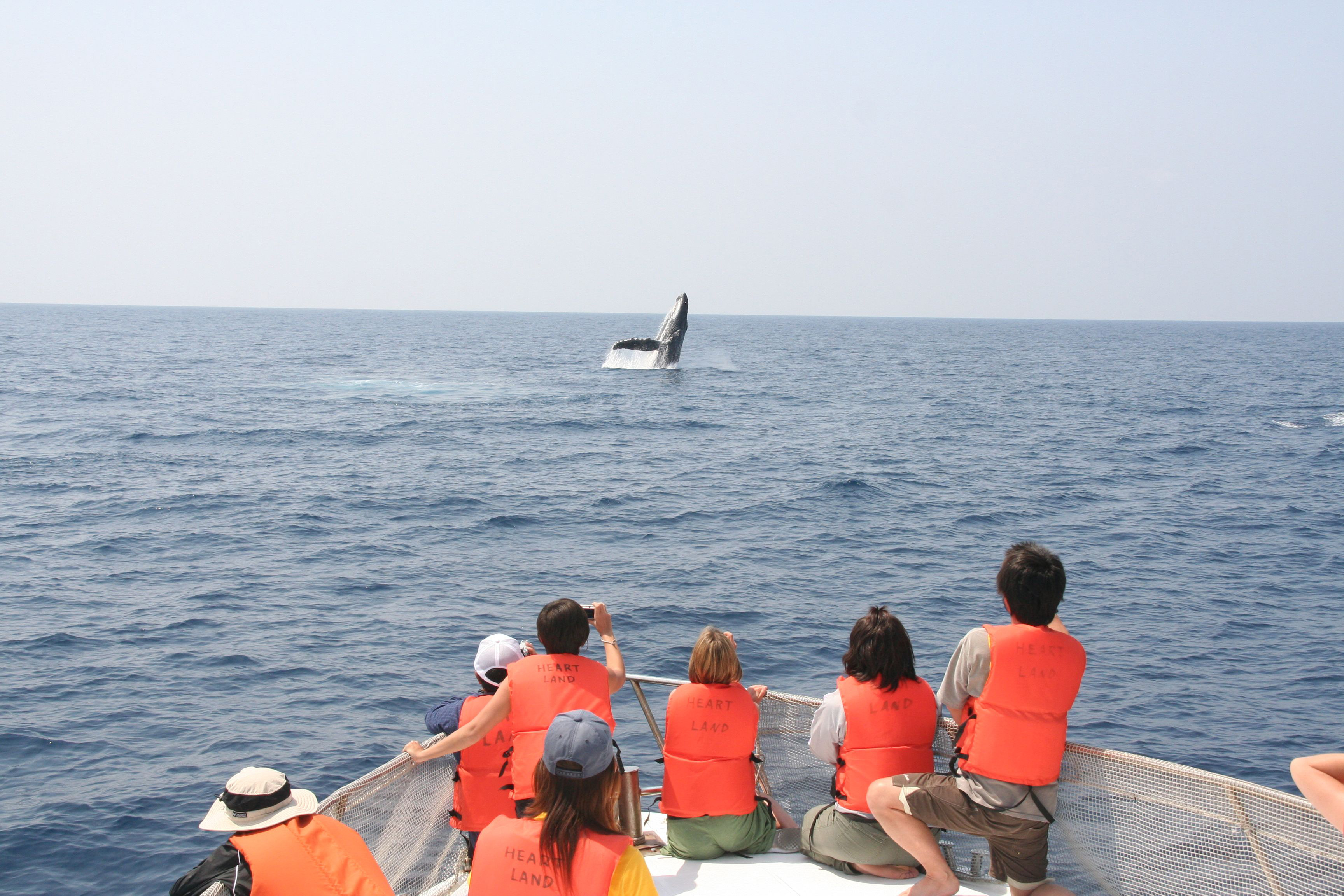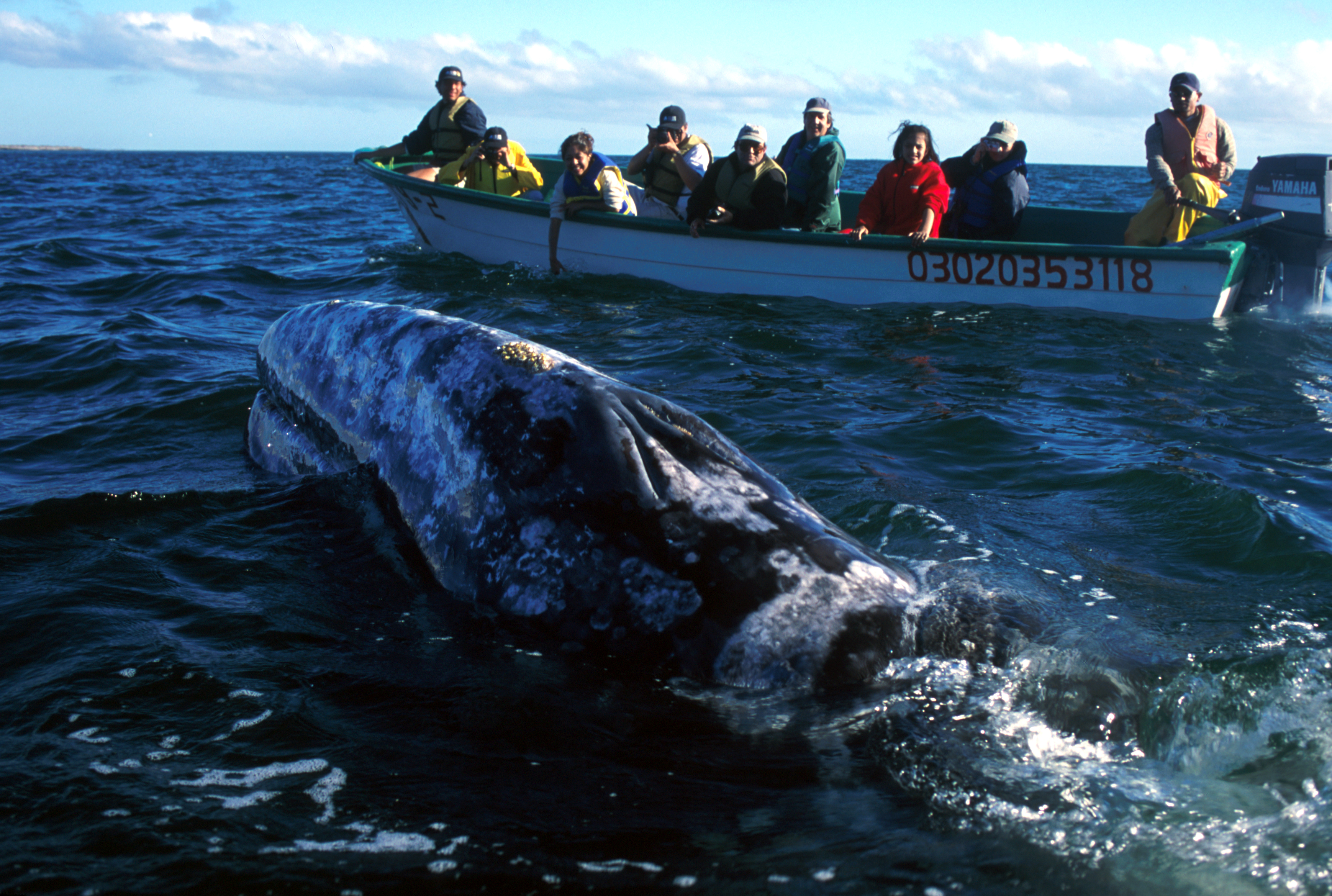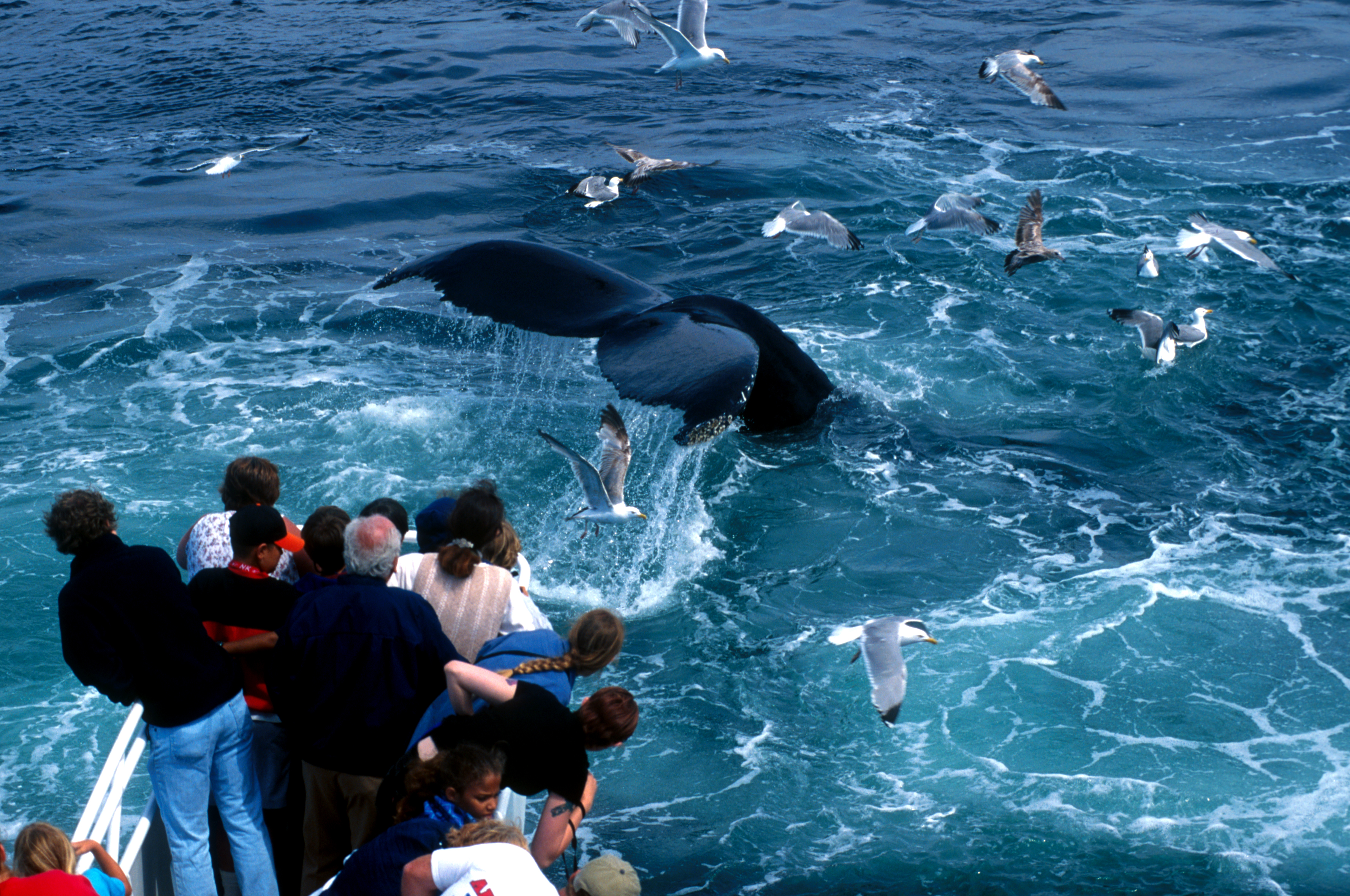Reducing Commercial Whaling in Iceland (SDG 8, SDG 11, SDG 12, SDG 14)
Description
Commercial whaling is an unsustainable and cruel practice that severely disrupts whale-watching tourism, which is one of Iceland’s most profitable and important industries. Not only does whaling remove whales from the population, it also causes whales to fear whale-watching boats. In 2010 , IFAW started the Meet Us Don’t Eat Us campaign to educate tourists about the facts of whale meat consumption (whale meat in Iceland is primarily eaten by tourists) and encourage political leaders to make whaling hotspot Faxaflói Bay a protected sanctuary. Surveys indicate the campaign has helped reduce tourists’ whale consumption by half since 2011.
The primary objective of the Meet Us Don’t Eat Us campaign is to end whaling in Iceland primarily by ending the primary cause of this practice which is demand for whale meat by tourists. IFAW’s goal is to help inform travelers about whale protection and the value of whale watching rather than the killing of whales for food. Visitors themselves are key in encouraging responsible tourism, and since the start of our campaign in 2010, more than 500 visiting volunteers from all over the world have participated.<br />
Specifically, IFAW informs and educates tourists about the facts regarding whale meat consumption in Iceland and appeal for their support to end commercial whaling instead of contributing to it by tasting whale meat in Reykjavík restaurants. It is important to note that whale hunting is not a traditional activity in Iceland and commercial whaling only started in 1948 with the company Hvalur, Inc. in Hvalfjordur. Before that, most of the whaling around Iceland was conducted by Norwegians, English, Danish, Dutch, Basques and others. In addition, according to an October 2013 Gallup poll, whale meat consumption by Icelanders is not common and only around three percent of Icelanders eat whale meat regularly. Therefore, whale meat consumption by tourists is the primary contributor to the number of whales being killed. <br />
Meet Us Don’t Eat Us is a positive campaign because IFAW approaches tourists and Icelanders in a constructive way, pointing out that the best sustainable way to enjoy whales is by responsible whale watching. By distributing informative material, promoting whale friendly restaurants, collecting signatures (which are regularly sent to the Iceland Minister of Fisheries to urge the government to stop whaling), and encouraging people to support whale watching, IFAW helps make people aware how much their choices matter. To date, surveys demonstrate that whale meat consumption by tourists has been reduced by 50 percent since the project started.
IFAW has been publicly campaigning in Iceland since 2003, and then launched the Meet Us, Don’t Eat Us campaign in 2010 and the petition campaigns in 2013. The execution of the program in close cooperation with a coalition of stakeholders (the Association of Icelandic Whale Watchers aka IceWhale) allowed the project to ensure that the project development directly benefited both, animals and people. In addition, incorporating community input led to unique ways of enabling and making the program sustainable and popular among the local community in Iceland. Monitoring mechanisms thus far have included surveys carried out by IFAW, which indicate that the campaign has helped reduce tourists' whale consumption.
The project also promotes inclusive and sustainable economic growth through its encouragement of whale watching over whale hunting. The touristic practice generates an estimated USD 26 million annually in revenue for the local economy. Iceland hosts an estimated 350,000 whale watchers per year, proving that whales are worth far more to the Icelandic economy alive than dead. Protecting Faxaflói Bay allows the whale-watching industry to thrive, creating jobs and contributing to Iceland’s largest industry: tourism. The tourists also support other industries such as restaurants, cultural centers, and hotels.
Since whaling resumed in Iceland in 2003, almost all minke whaling took place in Faxaflói Bay and 80 percent of it at the border of the whale watching area, resulting in clashes between whale watching operators and whaling supporters. In November 2017, the Iceland Minister of Fisheries and Agriculture enlarged once again the whale sanctuary in Faxaflói Bay, which had been disputed and changed twice since 2013. The enlargement of the whale sanctuary made operations for whalers very difficult. Historically, up to 85 percent of minke whales hunted in Iceland have been harpooned in what is now a protected area. Having to travel further offshore in search for whales became significantly more expensive, making operations for whalers very difficult. As a result of the expansion of the protected area and the direct educative contact with tourists, the hunting of minke whales ended in Iceland. In July 2018, media sources reported that the cost and poor profits made whaling no longer economically viable, which led to the decision to close the local whaling industry. Only six minke whales were caught in June and none in July—usually the peak month for hunting— out of a quota of 262. However, in September 2018, the CEO of Hvalur hf – the only company still involved in Icelandic fin whaling – announced the company’s intention to resume the hunting of fin whales (the second largest whale species which are also endangered)
Despite this milestone progress, there is still work to do in Iceland and other whaling countries. Due to the aforementioned changes, in 2018, Iceland also started to import minke whale meat from Norway – a country continuing to hunt whales. Although Icelandic whalers have stopped their operations, they are considering importing whale meat from Norway. IFAW will continue to campaign against whaling because it is unnecessary, cruel, and rapidly becoming socially unpopular.
As the whale watching industry continues to grow, IFAW and IceWhale seek to ensure that operators are communicating with one another in order to secure the protection of whale populations, while also offering one-of-a-kind experience for Iceland residents and visitors. IFAW has also collected over 70,000 postcards thus far with signatures from tourists and Icelanders who want the cruel and unnecessary whale hunt to end. These postcards are regularly sent to the Minister of Fisheries in order to emphasize the international and Icelandic opposition to whaling. This year, support from high profile Icelandic musicians has also helped increased the profile of the Meet Us Don’t Eat Us campaign.
The execution of the program in close cooperation with a coalition of stakeholders (the Association of Icelandic Whale Watchers aka IceWhale) allowed the project to ensure that the project development directly benefited both, animals and people. In addition, incorporating community input led to unique ways of enabling and making the program sustainable and popular among the local community in Iceland.
One particular innovative idea of the project was to develop a partnership with Airbnb, Inc. In 2018, Meet Us Don’t Eat Us started offering an exclusive experience through Airbnb’s Experience Social Impact Platform – a platform designed to offer a “social impact experience” designed to connect guests with a specific mission in which Airbnb waives its fees and so 100 percent of the proceeds go to the relevant nonprofit organization – to make the campaign activity and whale conservation education more accessible and fun for all global community.
In addition, whales are vital to ocean ecosystems. As Iceland faces threats of a warming climate, the environmental footprint of tourism must be minimized in order for the industry to sustain itself. Collaboration between operators, research bodies and organizations such as IFAW and IceWhale serve as a first step toward sustainable tourism.
The involvement of the local community and the international community in the project, has facilitated the sustainability and resilience of the project. By protecting the whale population, our work supports sustainable livelihoods in the whale-watching industry that also protects Iceland’s natural heritage. Whale-watching also indirectly supports related industries such as hospitality. Furthermore, a growing whale-watching tourism industry has led to the revitalization of Reykjavik’s harbor district, reinvigorating the harbor area with abundant restaurants, green spaces, and cultural centers to accommodate the flood of tourists passing through the harbor to go whale-watching. No city or community exists without animals, both wild and domestic. In order to ensure sustainable cities and communities, it is imperative that both the benefits and drawbacks of animal populations in and around cities are fully addressed.
Through the Meet Us Don’t Eat Us project, the local and international community in Iceland have the opportunity to establish and contribute to more sustainable conservation practices for endangered whales. With a project that is directly tied to the tourism industry, members of the local community have been able to revitalize the city of Reykjavik and surrounding areas, which has helped create economic growth in the community and also minimize the hunting of whales.<br />
IFAW was able to simultaneously reduce whale losses and animal suffering by encouraging responsible tourist behavior through social impact experiences while contributing to the economic growth and a sustainable city and communities. Tourist and animal wellbeing initiatives have been a valuable tool to improve the long-term success and sustainability of Iceland’s tourism industry and helped improve the safety and wellbeing of the community in a holistic manner. This project proves that sustainable conservation efforts must work with local communities as well as visiting tourists to change the paradigm from unsustainable and cruel use to sustainable eco-tourism.
SDGS & Targets
Deliverables & Timeline
Resources mobilized
Partnership Progress
| Name | Description |
|---|---|
| 14.2 | By 2020, sustainably manage and protect marine and coastal ecosystems to avoid significant adverse impacts, including by strengthening their resilience, and take action for their restoration in order to achieve healthy and productive oceans |
| 14.5 | By 2020, conserve at least 10 per cent of coastal and marine areas, consistent with national and international law and based on the best available scientific information |
| 14.c | Enhance the conservation and sustainable use of oceans and their resources by implementing international law as reflected in United Nations Convention on the Law of the Sea, which provides the legal framework for the conservation and sustainable use of oceans and their resources, as recalled in paragraph 158 of "The future we want" |
Feedback
Action Network


Timeline
Entity
Region
- Europe
Geographical coverage
Photos



Website/More information
Countries

Contact Information
Mark Hofberg, Campaigns Officer
